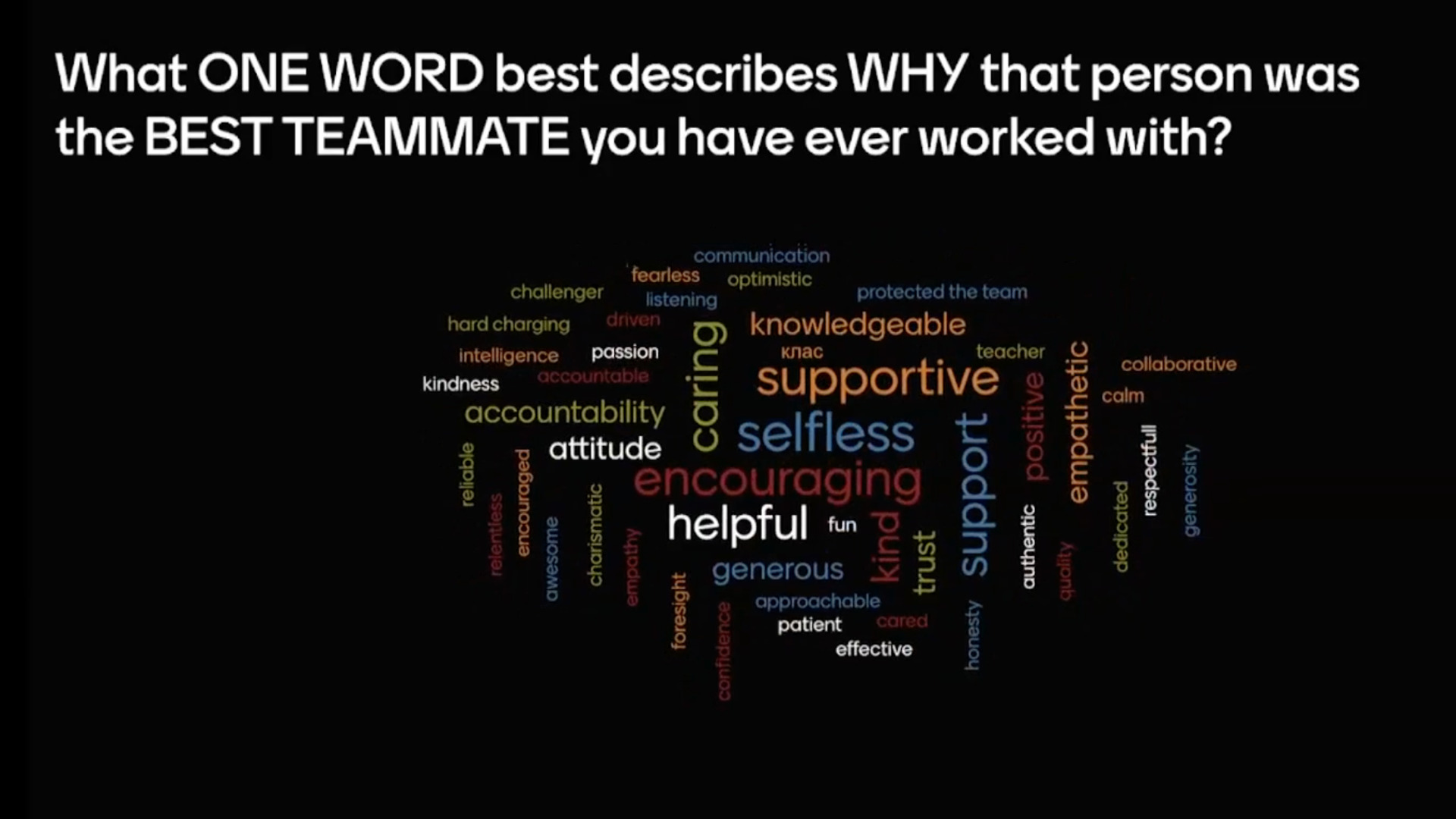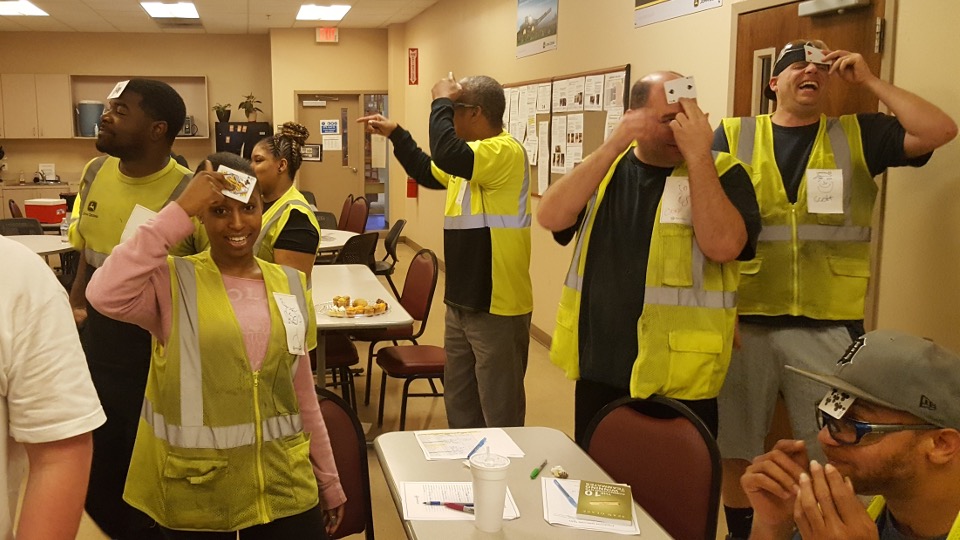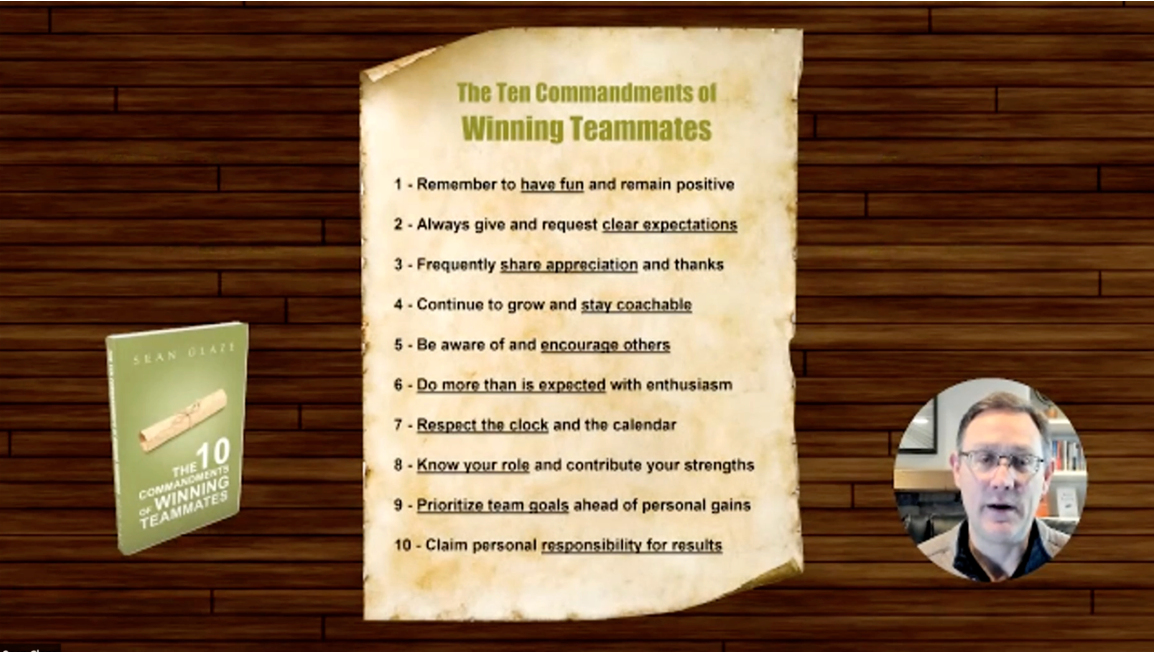As a team leader or employee, the quality of your days and the quality of your results is likely impacted significatnly by the quality of your teammates.
In my book, The 10 Commandments of Winning Teammates, the main character has lost his job and is traveling to take on a new position in a nother town – and during the journey, he asks each of the people he talks with one very interesting question:
“Who is the best teammate you ever had?”
That question results in him validating the list of traits that his coach had shared years earlier.
But as you know, you don’t have to be an athlete to appreciate the impact of a great teammate.
As the main character learns during the story, a great teamate is someone who
- respects the clock and calendar
- shares appreciation and thanks
- is aware of and encourages others
- claims personal responsibility for results
- stays coachable
- gives clear expectations
- (and a few others you can find in the book!)
In fact, when I speak at conferences, I often have the audience contribute their thoughts about what one word desrcibes the person they remember as a great teammate.
It is part of a live poll activiity…
Here is an example of the results:

In your organzations, your team members show up each day, in-person or virtually, hoping that YOU will demonstrate those traits.
Being a great teammate is often seen as a virtue in the workplace, but did you know that there are actually unexpected benefits to being a stellar team player? Research has shown that being a great teammate can not only improve your own work performance but also have positive impacts on your colleagues and the overall team dynamic.
Here are some unexpected benefits of being a great teammate:
Increased job satisfaction and engagement
Research has consistently shown that employees who have positive relationships with their colleagues are more engaged and satisfied with their jobs. In fact, a study conducted by Gallup found that employees who have a best friend at work are seven times more likely to be engaged in their jobs. When you prioritize building strong relationships with your teammates, you not only improve your own job satisfaction but also contribute to a more positive and engaged team environment.
Improved productivity
Collaboration is key in the workplace, and when teammates work well together, productivity can increase. A study conducted by the University of Michigan found that employees who collaborated frequently and effectively were more productive than those who worked alone. When you work well with your teammates, you can leverage each other’s strengths, share ideas, and problem-solve together, leading to more efficient and effective work.
Enhanced creativity
When you work with people from different backgrounds and perspectives, you can tap into a wider range of ideas and approaches. A study conducted by the University of Texas found that diversity in a team can lead to more creative and innovative ideas. By being a great teammate and valuing the perspectives of others, you can contribute to a more creative and innovative team environment.
Increased trust
Trust is essential in any team dynamic, and being a great teammate can help build trust among colleagues. When you consistently show up for your teammates, listen to their ideas, and offer support when needed, you demonstrate that you are reliable and trustworthy. This can create a positive feedback loop, as your teammates are more likely to reciprocate the trust and support that you have shown them.
Better health and well-being
Believe it or not, being a great teammate can actually have positive impacts on your health and well-being. Research has shown that having strong social connections can improve physical and mental health outcomes. When you prioritize building positive relationships with your colleagues, you can not only improve your own well-being but also contribute to a more supportive and caring team environment.
Being a great teammate has a wide range of unexpected benefits.
Being a great teammate definitely helps your coworkers
and your company succeed…
By prioritizing building positive relationships with your colleagues, you can not only improve your own job satisfaction and productivity but also contribute to a more creative, innovative, and supportive team environment.
But very little has been shared to clarify WHY YOU SHOULD BE A GREAT TEAMMATE.
Luckily, I have colected some very interesting statistics for you!
There is a growing body of research that suggests that individuals who work well with others and are reliable, supportive team members tend to perform better at work.
Great Teammates are also more likely to earn higher salaries…
And here are just a few examples from recent research studies:
The study on “pro-social” behaviors and salary:
A study published in the Journal of Occupational and Organizational Psychology found that employees who exhibited “pro-social” behaviors, such as helping others and cooperating with coworkers, tended to earn higher salaries than their less helpful colleagues.
https://onlinelibrary.wiley.com/doi/abs/10.1111/joop.12268
The study on “collective intelligence” and team performance:
Another study published in the journal PLOS ONE found that teams with high levels of “collective intelligence” – a measure of how well team members work together – tended to perform better on a variety of tasks and earn higher profits.
https://journals.plos.org/plosone/article?id=10.1371/journal.pone.0095978
The report on teamwork and dependability from SHRM:
A report from the Society for Human Resource Management found that “teamwork and dependability” were among the most important factors in determining employee performance and compensation.
The survey on the importance of teamwork and collaboration by LinkedIn:
According to a survey by LinkedIn, 80% of professionals believe that teamwork and collaboration are key to success in the workplace.
The University of Michigan study on agreeableness and salaries:
A study by the University of Michigan found that employees who rated high on agreeableness were more likely to earn higher salaries than those who rated lower on this trait.
https://www.ncbi.nlm.nih.gov/pmc/articles/PMC5538346/
The Harvard Business School study on helpfulness and promotions:
A study by Harvard Business School found that employees who help their colleagues were rated as more valuable by their supervisors, leading to more promotions and higher salaries.
https://hbr.org/2015/08/helping-coworkers-feels-good-but-it-might-not-help-your-career
The Globoforce survey on recognition and turnover:
A survey by Globoforce found that companies that recognize employees for their helpfulness and collaboration have a 31% lower voluntary turnover rate than those that don’t.
https://www.globoforce.com/wp-content/uploads/2015/03/SHRM-SP-Survey-Final.pdf
The University of Exeter study on supportiveness and leadership:
A study by the University of Exeter found that employees who were supportive and helpful to their colleagues were more likely to be viewed as leaders by their peers, leading to more opportunities for career advancement.
https://www.sciencedirect.com/science/article/abs/pii/S1048984309000332
The McKinsey & Company report on teamwork and innovation:
A report by McKinsey & Company found that employees who work well in teams and support each other are more likely to be innovative and successful in their work, leading to better business outcomes and career success.
These findings suggest that being a “Winning Teammate” and a reliable, supportive employee can have a significant impact on improving team success… and your income!
If you are interested in providing YOUR team with an engaging team building keynote experience at your next retreat or conference that will inspre and equip them to become Winning Teamates, let’s talk!
Glaze delivers engaging conference keynotes and interactive team building events that help healthcare and education leaders build more positive and profitable cultures.
education leaders build more positive and profitable cultures.
Sean is also an author, and each of his four books, The Unexpected Leader, Rapid Teamwork, The 10 Commandments of Winning Teammates, and Staying Coachable, are entertaining parables with powerful take-aways for team growth and leadership!
What issues are YOU dealing with that would disappear if you could build a team culture that inspired connection, accountability, and a team-first attitude?




